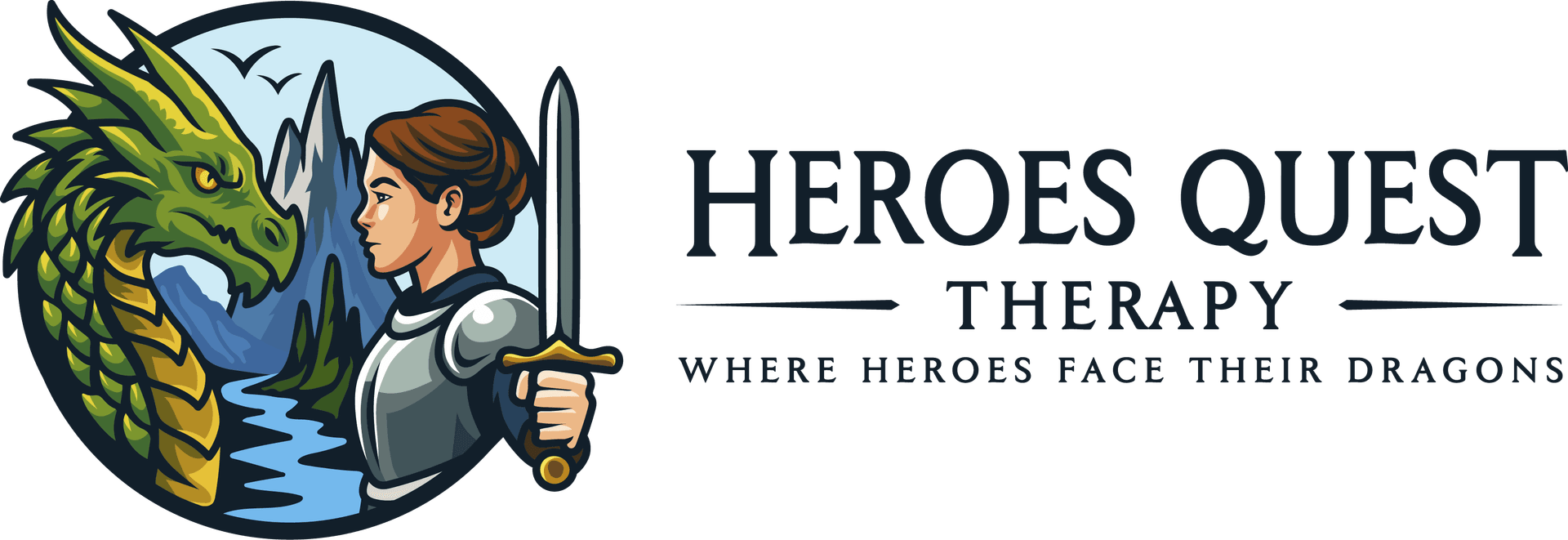An Open Letter to Colleagues, Clients, and Future Coaching Clients
Grammar TW: upcoming run-on sentence of awesome. I’m a Licensed Clinical Professional Counselor who loves the work of therapy. But today, I'm pleased to announce that Heroes Quest Therapy will also be adding life coaching services—delivered through narrative gameplay and structured skill practice via a shared Discord server with private engagement with your coach and daily brief journal prompts, as well as goals you set yourself and guidance to help you work toward and achieve them using proven methods from Acceptance and Commitment Therapy (ACT) in an immersive RPG experience—to serve people who want guidance, accountability, and momentum without entering a clinical container. Did you get all that?
This letter is for three audiences at once: my colleagues, my current clients, and those of you considering coaching with me.
Why add coaching?
Because many people are actively looking for a place to practice, to learn and grow without the need for a medical diagnosis. Coaching gives us a clear, non-clinical lane to teach skills, build routines, and keep folks accountable to their values and goals—especially when they thrive on community and a bit of play.
What coaching (on Discord) uniquely enables
- More frequent, lighter-weight touchpoints. Short, timely check-ins and micro-prompts can keep momentum between weekly sessions. That “nudge at the right moment” often makes the difference.
- Asynchronous engagement. People can respond when energy and availability line up—before work, after bedtime, during a lunch break—rather than forcing everything into a single weekly hour.
- Group energy that actually fits busy lives. Play-by-post and short live bursts let cohorts progress without requiring everyone to align schedules perfectly.
- Narrative motivation. Quests, side-quests, and in-world “boons” make behavior change sticky and fun. Practice becomes part of a story, not another chore.
- Private journaling with feedback. A short daily prompt and coach response can translate values into action—one small step at a time .
- Clarity and transparency. Coaching is education, practice, and accountability. We stay in that lane—and we say so up front.
How this complements therapy (without replacing it)
Different containers, different purposes. Therapy is diagnosis and treatment within licensure and healthcare systems. Coaching is structured skill-building for functioning adults, with clear goals and accountability.
Hand-offs when needed. If clinical concerns show up in coaching, we press pause and talk about next steps for therapy or referrals. Likewise, therapy clients who want a lighter, practice-focused space may choose coaching when that makes sense for them.
The practical setup
Where it happens. Coaching cohorts run via Discord (live or play-by-post), using daily micro-journal-prompts, brief check-ins, and scripted onboarding help including a reflection driven character creation process that helps participants create characters that are less about min/maxing stats (IYKYK) and more about building a character with narrative range and a background that actually aids in storytelling.
What you’ll do. Set values-aligned goals, tackle small “side-quests,” journal in short bursts, and celebrate wins with your party (choosing how much or how little you share, always) and by earning the six degrees of the Hexfold Path.
How we safeguard. We don’t collect or store clinical health information in Discord. Participants receive clear informed-consent materials about what coaching is (and is not), how data is handled, and what to do in emergencies.
Therapy with me remains therapy—within Kansas licensure and appropriate platforms. Coaching is available more broadly in a non-clinical format.
For colleagues
I know some clinicians have mixed feelings about life coaching and life coaches, with good reason. Let's face it, as clinicians we have years of education and experience, of supervised practice, internships and practicums, and continued education to learn all of the best, evidence-based practices to help our clients manage their mental health conditions, and there are plenty of life coaches out there who would not hesitate to assume the role of therapist after a college psychology class and watching a few too many episodes of Dr. Phil, or even out of truly well-meaning intentions—and maybe some of them are naturally good at helping their clients achieve results and do valuable, ethical work; I'm not here to disparage anyone from walking their path. But if your path was clinical and you feel like coaching is a step down or it somehow reduces your income potential to pay off those nasty student loans or you feel like it's less valuable work because it's not sanctioned by the insurance companies, I would encourage you to find your niche, gather your skills and abilities, and use your creativity to provide a coaching offering that leverages your clinical strengths and abilities and fits the way you want to work as a coach, and as you get results for your clients and demand increases, charge the premium that you deserve for all the work you put in.
And you can stay tuned to see how that works out for me. 😂 I'll be starting with modest rates and a promise that for every five people to achieve one of the six degrees of the Hexfold Path (corresponding to mastering one of the six principles of ACT), we will ALWAYS award one scholarship opportunity to join a degree-quest experience. The keys for us are:
- Bright lines. We define scope, we obtain informed consent, and we keep coaching non-clinical.
- Boundaries honored. We don’t diagnose, treat, or bill insurance in coaching. We escalate to therapy or refer when indicated.
- Craft elevated. We have to see this as an opportunity to leverage our understanding of EBPs and our ethical and other trainings to provide a level of coaching that helps us meet our clients needs in creative ways that meet our niche clients where they live.
Stay Tuned for more!
